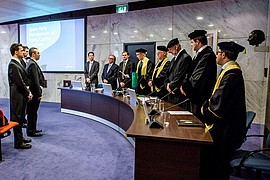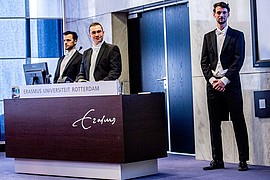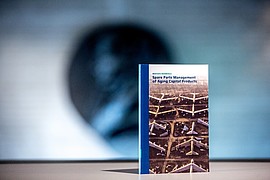PhD Defence: Mustafa Hekimoglu

In his dissertation ‘Spare Parts Management of Aging Capital Products’, ERIM’s <link people mustafa-hekimoglu>Mustafa Hekimoğlu considers supply risk in management of spare parts inventory.
Mustafa Hekimoğlu defended his dissertation in the Senate Hall at Erasmus University Rotterdam on Thursday, 26 November 2015, at 9:30. His supervisors were <link people rommert-dekker>Prof.dr.ir R. Dekker and <link people erwin-van-der-laan>Dr.E. van der Laan. Other members of the Doctoral Committee were Prof.dr. G.J. van Houtom (Tue), Prof.dr. H. Zijm (Twente), and dr. R. Kuik (RSM).
About Mustafa Hekimoglu

Mustafa Hekimoğlu holds a BSc. degree in industrial engineering from Dokuz Eylul University, Izmir and he received a MSc. degree in the same field from and Bogazici University, Istanbul. Later, he graduated from ERIM Master of Philosophy in Business Research and started his PhD in 2011. His fields of interest are supply chain management, inventory control and system dynamics modelling. He presented his scientific output in international conferences such as POMS, INFORMS, ISIR, MSOM. He contributed research papers published in {Decision Sciences} and {Energy Policy}. After the graduation, he will start working as an assistant professor at University, Istanbul.
Thesis Abstract

Spare parts are critical for operations of capital products such as aircraft, refineries, trucks, etc/, which require maintenance regularly. Original Equipment Manufacturers (OEMs) bear the responsibility of undisrupted maintenance service and spare parts flow for their capital products. Due to various factors OEMs lose their spare parts suppliers occasionally and these losses threaten the reliability of their maintenance service and capital products. In this thesis, we consider supply risk in management of spare parts inventory. The thesis consists of two parts: First we develop advance indicators for future supply problems of spare parts and suggest a model utilizing those indicators for inventory control of spare parts. Our results indicate that OEMs can save significantly by utilizing those indicators together with our model in their daily business. Second, we consider secondary markets and their effects on spare parts supply chains of OEMs. Secondary markets are chap supply sources for spare parts needs of OEMs. Therefore effective usage of them yield significant cost savings and boost service rate of OEMs. Furthermore, secondary markets are sources of competition since low prices on those markets attract some customers of OEMs. These two factors are considered from the perspective of spare parts inventory control. In the second part, we conclude that for OEMs it is beneficial to use secondary markets as a supply source as long as they adjust their selling prices accordingly.
· View and download Mustafa's dissertation
Photos: Chris Gorzeman / Capital Images


